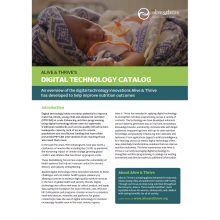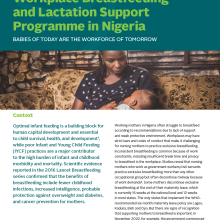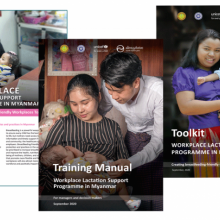Toolkit
Feb 01 2024

Alive & Thrive Digital Technology Catalog: An overview of the digital technology innovations Alive & Thrive has developed to help improve nutrition outcomes
Journal article
Feb 07 2023

The political economy of infant and young child feeding: confronting corporate power, overcoming structural barriers, and accelerating progress (Baker P, Smith JP, et al, The Lancet. 2023)
Despite increasing evidence about the value and importance of breastfeeding, less than half of the world's infants and young children (aged 0–36 months) are breastfed as recommended. This Series paper examines the social, political, and economic reasons for this problem.
Brief
Dec 15 2022

Workplace Breastfeeding and Lactation Support Program in Nigeria
This toolkit was developed based on lessons learned from a pilot workplace breastfeeding/lactation support program with the Nigeria Employers’ Consultative Association (NECA) Network of Entrepreneurial Women (NNEW) and other
Journal article
Sep 01 2022

Implementation and Effectiveness of Policies Adopted to Enable Breastfeeding in the Philippines Are Limited by Structural and Individual Barriers
The Philippines has adopted policies to protect, promote, and support breastfeeding on par with global standards, yet the impact of these policies is not well understood.
Toolkit
Dec 03 2020

Workplace lactation support programme in Myanmar
Breastfeeding is a powerful weapon in the fight to ensure every child has the best possible start to life, but mothers need access to accurate information and timely support from their family and community; the healthcare system; and their employers.
Journal article
Feb 11 2020

Suboptimal infant and young child feeding practices in rural Boucle du Mouhoun, Burkina Faso: Findings from a cross-sectional population-based survey (Sarrasat S., 2019. PLOS One)
Mothers in the rural Boucle de Mouhoun Region of Burkina Faso had low levels of knowledge of IYCF and practices, according to this study: 60% of children had the minimum meal frequency, while only 18% benefited from the minimum dietary diversity and 13% received minimum acceptable diet.

